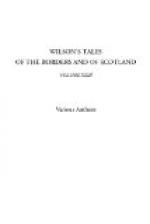of these reasons, if, indeed, the others were not
mere
adjecta, not to be taken into account;
whereas there were doubts if she was for herself ever
counted at all, except as the mere “old-pot”
which contained the realities. And their happiness
would certainly have been complete if it had not been—at
least in the case of Aminadab—that it could
be enjoyed only by passing through that grim medium,
a churchyard. But then, is not all celestial
bliss burdened by this condition; nay, is not even
our earthly bliss, which is a foretaste of heaven,
only a flower raised upon the rottenness of other
flowers—a type of the soul as it issues
from corruption? Yes, Aminadab could not get
to the holy of holies except by passing through Logie
kirkyard, a small and most romantic Golgotha, on the
left of the road leading to Lochee, whose inhabitants
it contained, and which was so limited and crowded,
that one might prefigure it as one of those holes
or dungeons in Michael Angelo’s pictures, belching
forth spirits in the shape of inverted tadpoles, the
tail uppermost, and yet representing ascending sparks.
The wickets that surrounded Logie House—lying
as it does upon the south side of Balgay Hill, and
flanked on the east by a deep gully, wherethrough
runs a small stream, which, so far as I know, has
no name—were locked at night. The terrors
of this place, at the late hours when these said henchmen
behoved to seek their savoury rewards, were the only
drawback to Aminadab’s supreme bliss.
And if the time of these symposial meetings had been
somewhat later in the century, how much more formidable
would have been a passage through this contracted
valley of tumuli and bones! No churchyard, except
those of Judea, was ever invested with such terrors—not
the mystical fears of a divine fate seen in the descending
cloud, with Justice gleaming with fiery eyes on Sin,
and holding those scales, the decision of which would
destine to eternal bliss or eternal woe, and that Justice
personified in Him “whose glory is a burning
like the burning of a fire,”—no, but
the revolting fears produced by the profanity of that
poor worm of very common mud, which has been since
the beginning of time acting the God. Ay, the
aurelia-born image of grace sees a difference when
it looks from the sun to the epigenetic thing which
He raises out of corruption. There was, in that
small place of skulls, a rehearsal of the great day.
We hear little of these freaks now-a-days; but it
was different then, when men made themselves demons
by drink. One night William Maule of Panmure,
then in his days of graceless frolic; Fletcher Read,
the nephew of the laird, and subsequently the laird
himself, of Logie; Rob Thornton, the merchant, Dudhope,
and other kindred spirits, who used to sing in the
inn of Sandy Morren, the hotel-keeper, “Death
begone, here’s none but souls,” sallied
drunk from the inn. The story goes that the night
was dark, and there stood at the door a hearse, which




